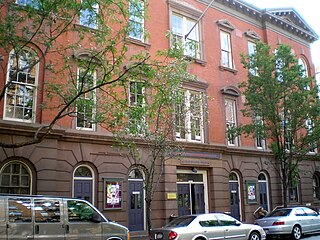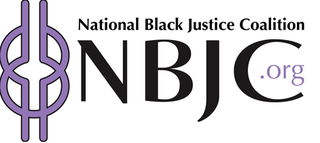Related Research Articles
The origin of the LGBT student movement can be linked to other activist movements from the mid-20th century in the United States. The Civil Rights Movement and Second-wave feminist movement were working towards equal rights for other minority groups in the United States. Though the student movement began a few years before the Stonewall riots, the riots helped to spur the student movement to take more action in the US. Despite this, the overall view of these gay liberation student organizations received minimal attention from contemporary LGBT historians. This oversight stems from the idea that the organizations were founded with haste as a result of the riots. Others historians argue that this group gives too much credit to groups that disagree with some of the basic principles of activist LGBT organizations.

The Lesbian, Gay, Bisexual & Transgender Community Center, commonly called The Center, is a nonprofit organization serving the lesbian, gay, bisexual and transgender (LGBTQ) population of New York City and nearby communities.

The Audre Lorde Project is a Brooklyn, New York–based organization for LGBTQ people of color. The organization concentrates on community organizing and radical nonviolent activism around progressive issues within New York City, especially relating to LGBTQ communities, AIDS and HIV activism, pro-immigrant activism, prison reform and organizing among youth of color. It is named for the lesbian-feminist poet and activist Audre Lorde and was founded in 1994.
Recorded history of the LGBT community in Seattle begins with the Washington Sodomy Law of 1893. In the 1920s and 1930s there were several establishments in Seattle which were open to homosexuals. The Double Header, opened in 1934, may have been the oldest continuously operating gay bar in the United States until it closed in December 2015. On 19 November 1958, an injunction instructed the city police not to question customers of gay bars unless there was a "good cause" in connection with an actual investigation. In the 1960s, Seattle came to be seen as providing an accepting environment, and an increasing number of gay and lesbians were drawn to the city. In 1967 University of Washington's Professor Nick Heer founded the Dorian Society, the first group in Seattle to support gay rights.

The Delaware Valley Legacy Fund (DVLF) is a community foundation whose mission is to support the needs of the lesbian, gay, bisexual, and transgender (LGBT) and straight-allied communities in Eastern Pennsylvania, Delaware, and New Jersey. It is engaged in building a permanent endowment and philanthropic apparatus to serve the fundraising and grant making. DVLF was founded in 1993 and is based in Center City Philadelphia.

The black gay pride movement is a global campaign tailored for black people who are also members of the LGBTQ community. Starting in the 1990s, black gay pride movements began as a way to provide black LGBT people an alternative to the largely white mainstream LGBT movement. According to some, white gay prides are seen to enforce, both consciously and unconsciously, a long history of ignoring the people of color who share in their experiences. The history of racial segregation seen in other organizations such as nursing associations, journalism associations, and fraternities is carried on into the black gay prides seen today. The exclusion of people of color in gay pride events is perceived by some to play into existing undertones of white superiority and racist political movements.

The first English-language use of the word "bisexual" to refer to sexual orientation occurred in 1892.

The National Black Justice Coalition (NBJC) is an American civil rights organization serving primarily Black lesbian, gay, bisexual, and transgender (LGBTQ) people. Since 2003, NBJC has collaborated with national civil rights groups and LGBT organizations, advocating for the unique challenges and needs of the African American LGBT community in the United States.
New York has a long history of LGBT community building, activism, and culture which extends to the early history of the city.
Throughout Dallas–Fort Worth, there is a large lesbian, gay, bisexual, and transgender community. Since 2005, DFW has constituted one of the largest LGBT communities in Texas.
The LGBTQ community in Chicago is one of the United States' most prominent, especially within the Midwest, alongside those of San Francisco and New York City, and holds a significant role in the progression of gay rights in the country. With a population of around 3 million, Chicago is the third biggest city in the US, and around 150,000 of those people identify as lesbian, bisexual, gay, transgender, questioning, or other.
D.C.Black Pride is the first official black gay pride event in the United States and one of two officially recognized festivals for the African-American LGBT community. It is a program of the Center for Black Equity (CBE) and is also affiliated with the Capital Pride Alliance. DC Black Pride is held annually on Memorial Day weekend.
Austin, Texas, has one of the most prominent and active LGBT populations in the United States. Austin was acclaimed by The Advocate in 2012 as part of its Gayest Cities in America, and was recognized by Travel and Leisure as one of America's Best Cities for Gay Travel. Much of Austin's gay nightlife scene is clustered around 4th Street. LGBT activism groups Atticus Circle and Equality Texas are headquartered in Austin.

Domestic violence in same-sex relationships or intragender violence is a pattern of violence or abuse that occurs within same-sex relationships. Domestic violence is an issue that affects people of any sexuality, but there are issues that affect victims of same-sex domestic violence specifically. These issues include homophobia, internalized homophobia, HIV and AIDS stigma, STD risk and other health issues, lack of legal support, and the violence they face being considered less serious than heterosexual domestic violence. Moreover, the issue of domestic violence in same-sex relationships has not been studied as comprehensively as domestic violence in heterosexual relationships. However, there are legal changes being made to help victims of domestic violence in same-sex relationships, as well as organizations that cater specifically to victims of domestic violence in same-sex relationships.

David Fair is an American activist who has been a leader in the labor, LGBT, AIDS, homeless and child advocacy movements in Philadelphia, PA since the 1970s. He has founded or co-founded several advocacy and service organizations, including the Philadelphia Lesbian and Gay Task Force (1977), the Philadelphia Gay Cultural Festival (1978), Lavender Health (1979), the Philadelphia/Delaware Valley Union of the Homeless (1985), Philly Homes 4 Youth (2017), and the Philadelphia Coalition on Opioids and Children (2018), and led the creation of numerous local government health and human service initiatives, including the AIDS Activities Coordinating Office for the Philadelphia Department of Public Health (1987) and the Division of Community-Based Prevention Services (2001), the Parenting Collaborative (2003), and the Quality Parenting Initiative (2014) for the Philadelphia Department of Human Services.

LGBT culture in Baltimore, Maryland is an important part of the culture of Baltimore, as well as being a focal point for the wider LGBT community in the Baltimore metropolitan area. Mount Vernon, known as Baltimore's gay village, is the central hub of the city's lesbian, gay, bisexual, and transgender communities.

In Washington, D.C., LGBT culture is heavily influenced by the U.S. federal government and the many nonprofit organizations headquartered in the city.
Michael S. Hinson Jr. (1966–2022) was an American Black and LGBTQ activist, educator, and researcher who lived in Philadelphia, Pennsylvania, and was the chief executive officer of SELF, Inc.
Gilberto Gerald, more commonly known as Gil, is an Afro-Panamanian activist, essayist and architect. He is known for HIV/AIDS activism, and LGBT rights in the United States.
References
- ↑ "Children's Hour · The ClubHouse, 1975-1990 · Rainbow History Project Digital Collections". rainbowhistory.omeka.net. Archived from the original on 2016-11-30. Retrieved 2016-11-30.
- ↑ "Children's Hour · The ClubHouse, 1975-1990 · Rainbow History Project Digital Collections". rainbowhistory.omeka.net. Archived from the original on 2016-11-30. Retrieved 2016-11-30.
- ↑ "Center for Black Equity". Center for Black Equity. Retrieved 2016-11-30.
- ↑ ""International Federation Of Black Prides" Becomes "Center For Black Equity" | National Black Justice Coalition". nbjc.org. Retrieved 2016-11-30.
- ↑ "Center for Black Equity". Center for Black Equity. Retrieved 2016-11-30.
- ↑ Director, Sharon J. Lettman-Hicks Executive; CEO; Coalition, National Black Justice (2014-03-13). "The State of Black LGBT People and Their Families". The Huffington Post. Retrieved 2016-11-30.
- ↑ "African American | Gay and Bisexual Men | HIV by Group | HIV/AIDS | CDC". www.cdc.gov. Retrieved 2016-11-30.
- Cannick, Jasmyne (June 9, 2005). "Celebrating Black Gay Pride". National Public Radio. Retrieved 2009-11-09.